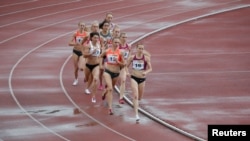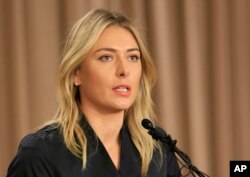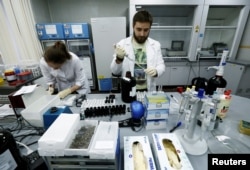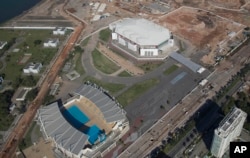At the Russian Track and Field team championships in Sochi late last month, high jumper Alexei Dmitriev looked out at the stands and admitted the scene unfolding was “a little sad.”
The Sochi weather was great. The stadium grounds were groomed and ready for competition. But the near-empty bleachers? Those were disheartening.
“See -- it’s just the athletes and their coaches cheering us on,” Dmitriev said.
It's been a tough year for Russian athletes -- and a new report issued Wednesday may make it even tougher: the World Anti-Doping Agency (WADA) said Russian athletes and team managers have systematically obstructed and evaded drug-testers over the past six months. For frustrated, top-ranked athletes, it was another blow.
At 32, Dmitriev is making what may be his last bid for a chance at joining the Russian Olympic squad. He siad he misses the drive and adrenalin that comes with competing in front of crowds and measuring himself against the world’s best.
Ever since a ban went into effect last November over allegations of widespread Russian doping, Dmitriev and the rest of the Russian track and field athletes have been forced to sit out international competitions because of what he calls "the scandals.”
“You don’t know what you’re training for,” he said. “Or why you’re even competing.”
Repeated infractions
Make no mistake: the past few months have been nothing short of a disaster for Russian sports.
Wednesday's report said more than 700 drug tests on Russian athletes were canceled or declined for a variety of reasons since last year, when WADA first accused Russia of widespread doping. Those initial accusations prompted the suspension last November.
There also is the meldonium scandal.
Meldonium, an over-the-counter heart medication widely used by Russians, was added to the banned substances list for international sports in January 2016. Positive tests for the drug have since snared dozens of Russian athletes, including former world tennis star Maria Sharapova, who received a two-year suspension from competition earlier this month after testing positive for the banned drug.
Grigory Rodchenkov, the former head of Russia’s anti-doping program, was cited for doping infractions in the November WADA report. Rodchenkov now says he worked on the Kremlin’s behalf to help Russian athletes dope their way to medals in the last three Olympics, including Russia’s triumphant showing at the 2014 Sochi Winter Games.
Russia was first in the medal count when it hosted the Sochi Games, a crowning achievement for Russian President Vladimir Putin and his efforts to return Russian sports to its former Soviet glory.
The report Wednesday laid out a variety of efforts to block tests: international testers faced armed intimidation and were threatened with explusion from the country when they tried to conduct tests in military cities. Many athletes list those cities as their hometowns, because it is harder for foreigners to gain access.
Other violations included competitors dropping out of events after they learned testers were on site, and skipping scheduled tests repeatedly. In one extreme case, an athlete apparently hid a container of clean urine on her body to use for the test. When the container spilled, she then tried to bribe the testing official.
Athletes suffer
The steady drip of doping scandals now risks undermining the achievements of 2014, and is leading to a growing international chorus calling for an outright ban on Russia’s participation in the Rio Games.
Russian athletes, meanwhile, argue they’re being unfairly singled out.
“It’s unjust,” says Ekaterina Kaneva, a long jumper who was among several Russian athletes who voiced suspicion that politics, rather than sports, was behind the attention given to Russia’s doping woes.
Kaneva served a two-year ban for use of illegal steroids in 2007, but is now hoping to make Russia’s Rio squad.
“Why is it only Russia that’s being punished when other countries also have doping problems?" she asked.
The official Russian response to the doping charges has ranged between displays of defiance and contrition. As charges of misconduct have grown, Kremlin officials have dismissed the allegations as an "information attack" aimed at scapegoating Russia for problems facing international sports.
But Russian sports officials have also implemented reforms, handing over control of their anti-doping operations to outside observers and suspending dozens of athletes for substance violations.
These moves ensure only clean athletes could compete in Rio, Kremlin officials said.
“I’ve never been tested this frequently,” said Sergey Shubenkov, the 2015 world champion in hurdles and one of Russia’s brightest medal hopes for the Summer Games.
New regulations
Under the new anti-doping regulations, Shubenkov said he has been tested every month and must inform officials of his whereabouts. He argued the moves are worth the trouble if they convince the doubters.
“The decision to my mind is really obvious. Just go and punish the ones affected with any, I know this (English) word, 'complicity,' " he said. “Let them be punished if they’ve violated the rules. But what am I punished for?”
For Shubenkov, a ban on competing would be a bitter, and familiar, pill.
His mother, Natalya Shubenkova, a top Soviet athlete in the heptathlon, missed the 1984 Olympics when the U.S.S.R. boycotted the Games in Los Angeles, California.
“She was at her career peak at that moment, she was unreachable,” he says of his mother’s chances for medaling in Los Angeles. “But she was fourth in the next Olympics in Seoul in 1988."
Like other athletes here, Shubenkov said he knows his Olympic dreams hinge on the decisions made Friday (June 17), when track and field’s world-governing body, the IAAF, gathers in Vienna to give its final verdict on Russia’s anti-doping progress.
The sporting body's decision will determine whether Russian athletes get a fresh start in Rio or will watch their Olympic dreams pass them by.



